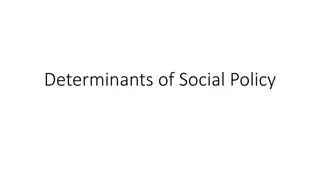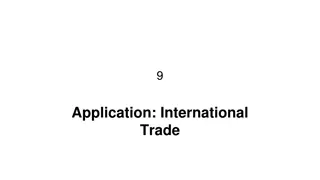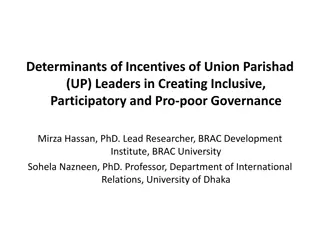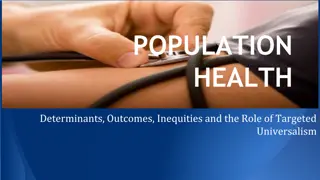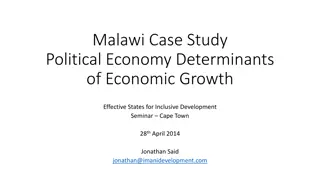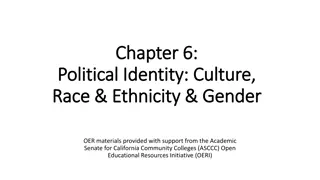Integrating Social Determinants of Health in Athletic Training Education
Explore the significance of incorporating social determinants of health (SDH) into athletic training education to enhance students' ability in identifying social factors at the point-of-care. The objectives include engaging students with SDH and implementing innovative teaching techniques. Learn abo
0 views • 37 slides
Determinants of Health: Understanding Factors Influencing Well-being
Health is a state of physical, mental, and social well-being, free from disease and infirmity. Determinants of health include heredity, environment, lifestyle, and socio-economic conditions. These factors can influence individual and population health outcomes, impacting overall quality of life. Pol
1 views • 31 slides
Impact of Evidence-based Supported Employment on Health and Social Determinants
Providing evidence-based supported employment can positively impact social determinants of health by addressing economic stability, reducing risk factors for preventable illnesses, and improving access to quality healthcare. Employment plays a crucial role in mental health intervention and can help
3 views • 36 slides
Community Health Needs Assessment in Victoria: A Focus on Social Determinants
This project focuses on conducting a health needs assessment in a specific community in Victoria, addressing a significant public health concern within the community. It discusses the social risk factors contributing to the chosen issue, policies, community resources, and the nurse's role in improvi
6 views • 8 slides
Determinants of Migration
Migration plays a crucial role in geographical population change, impacting areas of origin, destination, and migrants themselves. Factors such as economic, social, and demographic determinants influence the movement of populations, with push and pull factors operating simultaneously in various regi
0 views • 7 slides
Understanding the Wider Determinants of Health in the UK: A Critical Perspective
Exploring the impact of various societal factors on health outcomes in the UK, this report emphasizes the need to address wider determinants such as jobs, housing, discrimination, and poverty. By framing health communications effectively and highlighting inequalities, we can garner support for polic
1 views • 35 slides
Understanding the Determinants of Health: Exploring Factors Influencing Well-being
Explore the intricate web of factors affecting health and well-being, from socioeconomic and environmental influences to genetic predispositions. Learn about the social determinants of health and their impact on individual and population well-being. Gain insights into why framing health in societal
0 views • 16 slides
Understanding Social Determinants of Health and Their Impact on Well-being
Social determinants of health encompass a wide range of factors, including income, education, employment, and genetics, that significantly influence individual and population health outcomes. Research highlights the importance of addressing these determinants to improve health and reduce disparities
3 views • 30 slides
Interdisciplinary Approach in Political Science and Its Relation with History
The need for an interdisciplinary approach in political science emerged in the 20th century to study political issues from various social science perspectives. This approach emphasizes the interrelation between political science and other disciplines like history. History provides the foundation for
0 views • 23 slides
Insights on COVID-19 Impact: Changes in Health Determinants
Explore the technical supplement report on the wider determinants of health amid the COVID-19 pandemic in July 2021. The report delves into the impact on friends, family, community, education, income, employment, housing security, and homelessness. Detailed analyses reveal the effects on personal re
0 views • 21 slides
Institutionalism and Methodological Issues in Political Science
Institutionalism is a foundational concept in political science, emphasizing the study of governing institutions and their role in shaping political behavior. It explores inductive and deductive approaches to research, highlighting the significance of empirical evidence and theoretical assumptions.
0 views • 19 slides
Understanding Gramsci's Political Theory and its Relevance Today
Gramsci's political theory, focusing on concepts such as hegemony, historical bloc, and the role of intellectuals, offers valuable insights into contemporary political challenges. Explored through the lenses of Prof. Ken Spours and Stuart Hall's analytical tradition, this analysis sheds light on Con
0 views • 13 slides
Evolution of Citizenship in Liberal Democracy
Citizenship within liberal democracy entails equal rights, duties, liberties, and constraints for individuals within a political community. The entrenchment of civil and political rights has shaped the struggle for membership and participation in political communities. Civil rights, essential for in
1 views • 11 slides
Understanding Social Determinants of Health in Oncology Patient Navigation
Explore the significance of social determinants of health and health disparities in the context of oncology patient navigation. Delve into the history, models, and core competencies of patient navigation while addressing the impact of medically underserved populations and cancer health disparities.
0 views • 37 slides
Understanding Determinants of Maternal Death and Response Strategies
Explore the causes and determinants of maternal death, highlighting factors such as poor access to family planning, lack of skilled attendance at delivery, and societal influences. Learn about the Three Delays model and how it relates to seeking emergency obstetric care.
0 views • 18 slides
Key Determinants of Social Policy Development
Social policy is shaped by various determinants such as economic factors, cultural values, political aspects, family systems, and international consultants. Economic conditions, cultural norms, political stability, family structures, and global influences all play a crucial role in formulating socia
1 views • 8 slides
Understanding Central Place Theory: Key Concepts and Determinants
Central Place Theory (CPT) attempts to explain the spatial arrangement, size, and number of settlements based on central places, zones of influence, and hinterlands. This theory, introduced by Walter Christaller in 1933, outlines the importance of central functions, threshold populations, and factor
0 views • 12 slides
Understanding Social Determinants of Health (SDH) and the Nurse's Role
Explore the impact of Social Determinants of Health (SDH) on individual and population health outcomes. Learn about key SDH factors, the nurse's role in addressing SDH needs, and how SDH influence overall well-being. Enhance your understanding of SDH through examples and discussions on factors like
2 views • 38 slides
International Trade: Determinants and Impacts
Explore the key determinants of international trade, including comparative advantage and world prices. Understand how countries decide to import or export goods and the effects of free trade on domestic and world prices. Discover the winners and losers from trade and the arguments for restricting tr
0 views • 34 slides
Understanding Political Theory through a Contextual Approach
Exploring G.H. Sabine's perspective on political theory through a contextual approach, emphasizing the importance of historical context and societal influences. Sabine argues that while political theory evolves with its contemporary politics, it should be analyzed within its specific time and social
0 views • 9 slides
Understanding Determinants of Maternal Death: Causes, Factors, and Response
This educational session delves into the determinants of maternal death, distinguishing between causes and factors that increase the risk of maternal mortality. It covers possible determinants like hemorrhage, sepsis, and poor access to healthcare services, and discusses the Three Delays model for i
0 views • 18 slides
Understanding Political Beliefs and Behaviors: A Comprehensive Overview
Explore the formation, evolution, and transmission of political beliefs, as well as the impact of differing beliefs and behaviors on the political process. Delve into platform issues, political affiliations, and their influences to gain a deeper understanding of the political landscape.
1 views • 53 slides
Understanding Nationalism in Political Science
Nationalism, a complex concept, defines the nation as the fundamental unit of political rule. It encompasses a mix of objective and subjective factors, including cultural, ethnic, and political traits. The definition of a nation is subjective, based on how its members perceive themselves as a distin
0 views • 27 slides
Understanding Social Determinants of Health for Improved Well-being
Exploring the impact of social determinants of health on individuals' well-being through examples and statistics. Learn about factors influencing health behaviors, such as income distribution, education, employment conditions, and childhood development. Discover how these determinants shape health o
0 views • 21 slides
Understanding Political Science: A Comprehensive Overview
The study of political science delves into various aspects, from the pursuit of the good society to the exercise of power and the allocation of resources. It encompasses specialized fields such as American politics, international relations, comparative politics, public policy, and political philosop
0 views • 5 slides
Understanding the Political Context of Public Health in New Zealand
This paper delves into the political landscape of public health in New Zealand, emphasizing the importance of analyzing political influences to enhance public health initiatives. It explores various theories such as Interest Group Theory, Institutional Theory, and Theory of Political Economy to unde
0 views • 20 slides
Political Determinants of Incentives in Local Governance: Bangladesh Context
Study delves into the political determinants shaping incentives of Union Parishad (UP) leaders in Bangladesh for creating inclusive, participatory, and pro-poor governance. It explores the nuanced relationship between citizens and elected representatives, highlighting the role of social accountabili
0 views • 12 slides
Political Development Theory and Practice: An Overview
Political development refers to the evolution of institutions forming the political power system of a society. Initially popular in the 60s-70s to describe political change, it later fell out of favor for being Euro-centric but has since regained significance. The concept encompasses aspects like po
0 views • 13 slides
Political Party Funding Act 2018 Overview
The Political Party Funding Act of 2018 in South Africa aims to enhance multi-party democracy by regulating the funding and donations to political parties. It establishes the Multi-Party Democracy Fund funded by private sources, alongside the existing Represented Political Party Fund. The Act prohib
0 views • 17 slides
Understanding Political Party Funding Act of 2018
The Political Party Funding Act of 2018 regulates the funding of political parties in South Africa, ensuring equitable and proportional funding for parties participating in national and provincial legislatures. The Act defines various terms such as donations, foreign persons, and political parties,
0 views • 42 slides
Understanding Population Health: Determinants, Inequities, and Outcomes
Explore the intricate web of determinants influencing population health, including natural and social factors. Learn how targeted universalism can address health inequities and promote better health outcomes for all. Discover the key themes and importance of population health at all levels, along wi
0 views • 18 slides
Evolution of Political Ideas and Influences on American Founding
In the history of politics, major ideas like laws of nature, unalienable rights, divine right of kings, social contract theory, and rights of resistance have influenced the American founding. Various traditions such as Judeo-Christian, English common law, Enlightenment, and republicanism played a si
0 views • 68 slides
Political Economy Determinants of Economic Growth: Malawi Case Study
Presenting findings from a seminar in Cape Town, this case study delves into Malawi's political dynamics impacting economic growth, historical evolution, growth acceleration, maintenance, and structural transformation. Analyzing the roles of institutions, political elites, and business in shaping gr
0 views • 35 slides
Explore the Fascinating World of Political Science
The Department of Political Science offers a range of courses, delving into topics such as political theory, international relations, and governance. Understand the distinction between politicians and political scientists, and explore branches of political science like public administration and huma
0 views • 16 slides
Understanding Political Identity: Culture, Race & Gender in Society
Explore the intricate aspects of political identity, culture, race, ethnicity, and gender in society. Discover how individuals shape their identities and the impact of political mobilization on society. Uncover the significance of political socialization and the role of societal institutions in shap
0 views • 20 slides
Evolution of Political Protests in Modern Russia: A Historical Overview
This article provides an in-depth analysis of the evolution of political protests in modern Russia from 1990 to present. It discusses the attitude of Russian journalists towards protests, basic concepts of political protest in modern political science, myths surrounding protests in Russia, and the f
0 views • 24 slides
Impact of Political Stability on Equity Trading Costs of Cross-Listed Firms
The research explores the relationship between political stability and equity trading costs of cross-listed firms, highlighting the impact of political institutions, liquidity, and investor protection. It delves into the importance of factors like quality of political institutions, transparency, and
0 views • 24 slides
Interdisciplinary Relationships in Political Science
Political science and history share a symbiotic relationship, with history providing the foundation for political analysis while political science influences historical events. The contribution of economics to political science is evident in how economic conditions shape political ideologies and pol
0 views • 12 slides
Understanding Political Theory: Definitions, Differences, and Significance
Political theory encompasses systematic explanations of political phenomena, distinct from political thought which involves ideas and opinions of philosophers. It constitutes both political science and philosophy, addressing both empirical and evaluative aspects. The significance lies in finding sol
0 views • 7 slides
Remedial Measures Implemented by Indian Political Party
Explore the impactful remedial measures taken by a prominent political party in India through a collage presentation. Delve into the functions of political parties, understanding partisanship, the necessity of political parties, and more. Gain insights into the significance and role of political par
0 views • 23 slides















